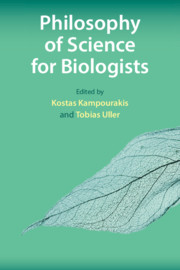Book contents
- Philosophy of Science for Biologists
- Philosophy of Science for Biologists
- Copyright page
- Contents
- Contributors
- Preface
- 1 Why Should Biologists Care about the Philosophy of Science?
- 2 What Constitutes an Explanation in Biology?
- 3 What Is Biological Knowledge?
- 4 What Is the Nature of Theories and Models in Biology?
- 5 How Are Biology Concepts Used and Transformed?
- 6 Why Does It Matter That Many Biology Concepts Are Metaphors?
- 7 How Do Concepts Contribute to Scientific Advancement?
- 8 How Can Conceptual Analysis Contribute to Scientific Practice?
- 9 What Methods Do Life Scientists Use?
- 10 Is It Possible to Scientifically Reconstruct the History of Life on Earth?
- 11 What Is the Basis of Biological Classification?
- 12 What Is the Nature of Scientific Controversies in the Biological Sciences?
- 13 What Is the Relation between Facts and Values in Biological Science?
- 14 A Philosopher in the Age of Creationism
- 15 How Can We Teach Philosophy of Science to Biologists?
- Further Reading
- Index
- References
15 - How Can We Teach Philosophy of Science to Biologists?
Published online by Cambridge University Press: 04 September 2020
- Philosophy of Science for Biologists
- Philosophy of Science for Biologists
- Copyright page
- Contents
- Contributors
- Preface
- 1 Why Should Biologists Care about the Philosophy of Science?
- 2 What Constitutes an Explanation in Biology?
- 3 What Is Biological Knowledge?
- 4 What Is the Nature of Theories and Models in Biology?
- 5 How Are Biology Concepts Used and Transformed?
- 6 Why Does It Matter That Many Biology Concepts Are Metaphors?
- 7 How Do Concepts Contribute to Scientific Advancement?
- 8 How Can Conceptual Analysis Contribute to Scientific Practice?
- 9 What Methods Do Life Scientists Use?
- 10 Is It Possible to Scientifically Reconstruct the History of Life on Earth?
- 11 What Is the Basis of Biological Classification?
- 12 What Is the Nature of Scientific Controversies in the Biological Sciences?
- 13 What Is the Relation between Facts and Values in Biological Science?
- 14 A Philosopher in the Age of Creationism
- 15 How Can We Teach Philosophy of Science to Biologists?
- Further Reading
- Index
- References
Summary
So, we now have a book on philosophy of science written for biologists, which contains topics that its editors (both of them biologists) thought would be useful. Whereas we hope that many biologists will read it and reflect on philosophy of science, this is not the only role we envisaged for this book. We also believe that the book could be used in courses for biology undergraduates and graduates. It could be used in a course on philosophy of science, or as a supplement to a biology-focused course that would at the same time aim to promote philosophical reflection among participants. In either case, what is important for anyone who would use this book for teaching purposes is that the contributors to the present book have highlighted some major themes to be discussed.
- Type
- Chapter
- Information
- Philosophy of Science for Biologists , pp. 299 - 312Publisher: Cambridge University PressPrint publication year: 2020



